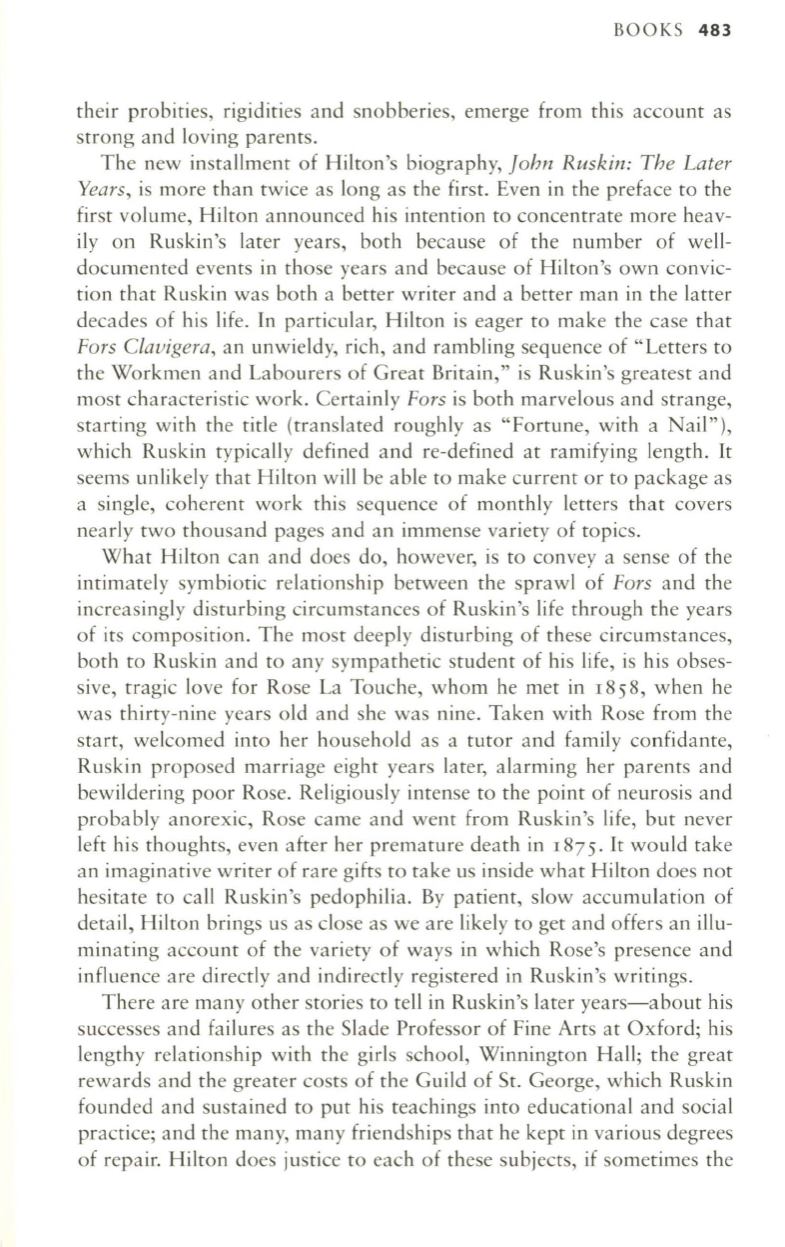
BOOKS
483
their probities, rigidities and snobberies, emerge from this account as
strong and loving parents.
The new installment of Hilton's biography,
John Ruskin: The Later
Years,
is more than twice as long as the first. Even in the preface to the
first volume, Hilton announced his intention to concentrate more heav–
ily on Ruskin's later years, both because of the number of well–
documented events in those years and because of Hilton's own convic–
tion that Ruskin was both a better writer and a better man in the latter
decades of his life. In particular, Hilton is eager to make the case that
Fors Clavigera,
an unwieldy, rich, and rambling sequence of "Letters to
the Workmen and Labourers of Great Britain," is Ruskin's greatest and
most characteristic work. Certainly
Fors
is both marvelous and strange,
starting with the title (translated roughly as "Fortune, with a Nail"),
which Ruskin typically defined and re-defined at ramifying length.
It
seems unlikely that Hilton will be able to make current or to package as
a single, coherent work this sequence of monthly letters that covers
nearly two thousand pages and an immense variety of topics.
What Hilton can and does do, however, is to convey a sense of the
intimately symbiotic relationship between the sprawl of
Fors
and the
increasingly disturbing circumstances of Ruskin's life through the years
of its composition. The most deeply disturbing of these circumstances,
both to Ruskin and to any sympathetic student of his life, is his obses–
sive, tragic love for Rose La Touche, whom he met in
1858,
when he
was thirty-nine years old and she was nine. Taken with Rose from the
start, welcomed into her household as a tutor and family confidante,
Ruskin proposed marriage eight years later, alarming her parents and
bewildering poor Rose. Religiously intense to the point of neurosis and
probably anorexic, Rose came and went from Ruskin's life, but never
left his thoughts, even after her premature death in
1875.
It
would take
an imaginative writer of rare gifts to take us inside what Hilton does not
hesitate to call Ruskin's pedophilia. By patient, slow accumulation of
detail, Hilton brings us as close as we are likely to get and offers an illu–
minating account of the variety of ways in which Rose's presence and
influence are directly and indirectly registered in Ruskin's writings.
There are many other stories to tell in Ruskin's later years-about his
successes and failures as the Slade Professor of Fine Arts at Oxford; his
lengthy relationship with the girls school, Winnington Hall; the great
rewards and the greater costs of the Guild of St. George, which Ruskin
founded and sustained to put his teachings into educational and social
practice; and the many, many friendships that he kept in various degrees
of repair. Hilton does justice to each of these subjects, if sometimes the


